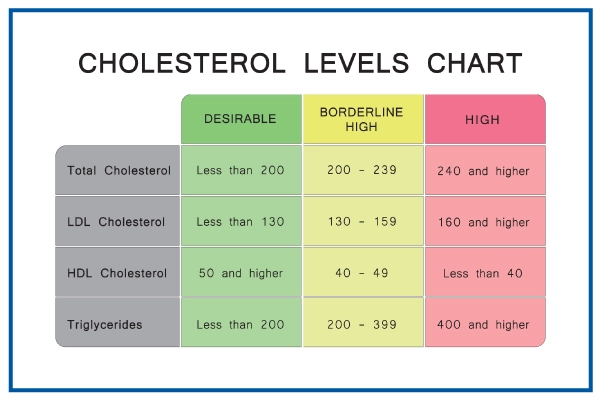- Cardiology 84
- Dermatology 45
- Endocrinology 33
- ENT 16
- Fertility 190
- Gastroenterology 78
- General-Medicine 81
- Gynecology 80
- Hematology 19
- Infectious-Diseases 33
- Neurology 52
- Oncology 34
- Ophthalmology 23
- Orthopedics 69
- Pediatrics 31
- Procedure 23
- Public-Health 144
- Pulmonology 59
- Radiology 8
- Urology 68
- Wellness 161
- Woman-and-child 77

Understanding Cholesterol Levels, Causes and Lifestyle Changes
Cholesterol is a waxy molecule found in the blood. The body requires cholesterol to build healthy cells, but high amounts of cholesterol can increase the risk of heart disease. Making simple lifestyle changes can effectively manage bad cholesterol.
The changes enhance cholesterol levels and amplify the impact of medications. High cholesterol can lead to fatty deposits in blood vessels, which can restrict blood flow and increase the risk of heart attack or stroke.
Secure your health with a second opinion. Make informed decisions and book your appointment today!
Get A Second OpinionWhat Causes High Cholesterol in the Body?
An unhealthy lifestyle is the most common cause of high cholesterol levels. Such habits include;
- Unhealthy eating habits include consuming high amounts of saturated fats in certain meats, chocolates, dairy products, baked goods, and processed foods.
- Trans fat is another form that can be found in fried and processed meals. Consuming these fats may increase LDL (bad) cholesterol.
- Lack of physical activity can lower HDL (good) cholesterol.
- Smoking reduces HDL cholesterol, especially in women. It also raises LDL cholesterol.
- High cholesterol can also be caused by genetics and other medical problems and medications.
Healthy Lifestyle Changes to Lower Your Cholesterol Levels
Medications can help lower cholesterol levels. However, the first step is to make lifestyle changes, such as eating a proper diet, exercising regularly, and making other changes. Here are five tips to get you started!
Eat Heart-Healthy Foods
A few dietary changes can lower your cholesterol levels and help improve your overall heart health:
- Fatty Fish: Rich in omega-3 fatty acids, which promote heart health.
- Leafy Greens: High in vitamins, minerals, and antioxidants, beneficial for overall heart function.
- Whole Grains: Provide fibre, vitamins, and minerals that support heart health.
- Berries: Packed with antioxidants, fibre, and phytonutrients that benefit heart function.
- Avocados: They contain healthy fats that help lower bad cholesterol levels.
- Nuts and Seeds: Provide healthy fats, fibre, and antioxidants that are good for the heart.
- Legumes: High in fibre, protein, and other nutrients that support heart health.
- Tomatoes: Rich in antioxidants like lycopene, which may reduce the risk of heart disease.
- Dark Chocolate: Contains flavonoids that can improve heart health when consumed in moderation.
- Olive Oil: A source of healthy monounsaturated fats that are beneficial for heart health.
Including these foods in a balanced diet can help maintain a healthy heart and reduce the risk of heart disease.
Exercise and Heart Health
Regular exercise boosts HDL (good) cholesterol and lowers overall cholesterol, supporting heart health.
Quitting Smoking
Improves HDL cholesterol and normalizes blood pressure and heart rate, reducing heart disease risk.
Long-Term Benefits
Better circulation and lung function within months. Halved risk of heart disease within a year after quitting smoking.
Weight Management
Increased activity helps manage weight, which is crucial for heart health.
Alcohol
Moderate intake of alcohol may raise HDL cholesterol. Excessive drinking raises risks like high blood pressure, strokes, and heart failure, harming heart health.
Ready to take control of your health journey? Book your appointment now and start your path towards wellness today!
Book an AppointmentConclusion
At times, these steps have little impact on cholesterol, though they can still improve your overall health in many ways. Even if your doctor prescribes medicines to lower cholesterol levels, continue to follow the above lifestyle changes. They will definitely make you feel better and may also help reduce your medicine dosage.
To avoid any cholesterol-related heart problems, you can get a complete heart check-up test that includes a lipid profile blood test at regular intervals.
Frequently Asked Questions
Engaging in regular physical activities like walking, cycling, or swimming can increase HDL (good) cholesterol and decrease LDL (bad) cholesterol, supporting better heart health.
Achieving and maintaining a healthy weight through a balanced diet and regular exercise can lower LDL cholesterol and enhance overall heart health.
Stopping smoking can boost HDL cholesterol and decrease the risk of heart disease, even if it doesn’t immediately change cholesterol levels.
Reduce alcohol consumption, manage stress, and consider adding cholesterol-lowering foods and supplements like soluble fiber (found in oats and beans) and plant sterols to your diet.
Results vary, but many people see improvements in their cholesterol levels within weeks to months of making healthy lifestyle changes.
Yes, many individuals can successfully manage their cholesterol levels through lifestyle changes alone. However, it's important to consult with a healthcare provider for personalized advice and monitoring.

- Cardiology 2132
- Dermatology 168
- Endocrinology 135
- ENT 97
- Fertility 217
- Gastroenterology 232
- General 478
- General-Medicine 1685
- Gynecology 169
- Hematology 85
- Infectious-Diseases 208
- Neurology 207
- Oncology 345
- Ophthalmology 65
- Orthopedics 187
- Pediatrics 83
- Procedure 72
- Public-Health 209
- Pulmonology 126
- Radiology 13
- Second Opinion 311
- Urology 294
- Wellness 600
- Woman-and-child 447
- Others 10217
Related Blogs
If you have any questions, please fill out the enquiry form or call us, and we will get back to you promptly.
040-68334455